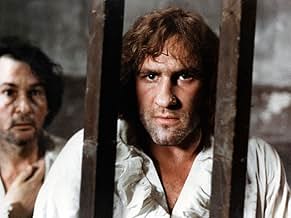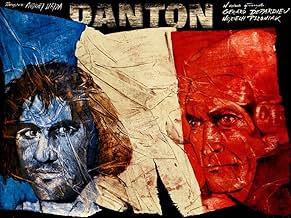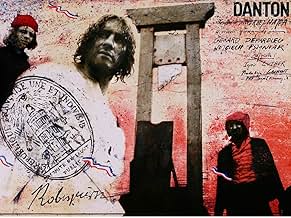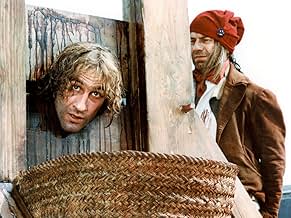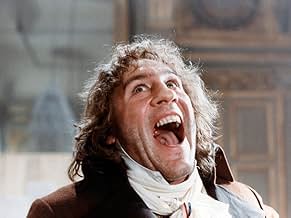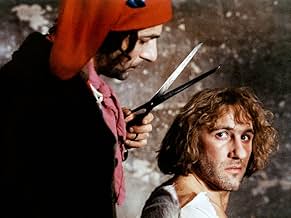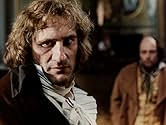Danton
- 1983
- Tous publics
- 2h 16min
NOTE IMDb
7,4/10
8,1 k
MA NOTE
En 1793, alors que la Terreur commence en France, Georges Danton, un défenseur du peuple, revient pour affronter Maximilien Robespierre et son parti extrémiste.En 1793, alors que la Terreur commence en France, Georges Danton, un défenseur du peuple, revient pour affronter Maximilien Robespierre et son parti extrémiste.En 1793, alors que la Terreur commence en France, Georges Danton, un défenseur du peuple, revient pour affronter Maximilien Robespierre et son parti extrémiste.
- Réalisation
- Scénario
- Casting principal
- Victoire aux 1 BAFTA Award
- 7 victoires et 7 nominations au total
Patrice Chéreau
- Camille Desmoulins
- (as Patrice Chereau)
Alain Macé
- Héron
- (as Alain Mace)
Avis à la une
Danton was a hero and one of the founders of the French Revolution of 1789. This movie is set five years later and the revolution has morphed into something ugly. While initially the revolution promised freedom, at this point the small committee running the country is extremely repressive and is a dictatorship. Danton and his friends were angry at how the country wasn't better off in 1794 than it was BEFORE they got rid of their king, so they begin criticizing the government. The movie begins as the printer who makes critical pamphlets concerning the government is beaten and his business is destroyed. So much for "liberty, equality and fraternity"! So, as a result of being silenced this way, Danton et al begin publicly criticizing the government. Eventually, Robespierre (the leader of the committee) and his cronies trump up charges, have a show trial and get rid of the dissent. Some have mentioned that the Polish director, Wajda, also intended this to be a criticism of his own nation--which, at the time, was Soviet-dominated and very repressive as well. This makes sense as you see the movie unfold--especially when the government destroys all dissent "in the name of the people".
The acting is fine, the story compelling and I have no major criticism of the film. However, I really wish the ending had been handled differently. Especially because other than history lovers and French people, most probably have no idea that this execution helped to end the government. AFTER this purge of Danton in April 1794, Robespierre himself was executed in July 1794 because the country had just had enough--plus, those surviving Frenchmen knew that they, too, would face the guillotine sooner or later if this sick system remained in place. Some sort of an epilogue would have been nice--such as showing the soldiers coming for Robespierre. He responded by trying to kill himself first, but he only succeeded in blowing off part of his face--still alive, he was guillotined shortly afterward. This would have been a dandy little epilogue and could have been done in about five minutes. However, not showing a connection between Danton's death and the fall of the government is an odd thing to omit.
The acting is fine, the story compelling and I have no major criticism of the film. However, I really wish the ending had been handled differently. Especially because other than history lovers and French people, most probably have no idea that this execution helped to end the government. AFTER this purge of Danton in April 1794, Robespierre himself was executed in July 1794 because the country had just had enough--plus, those surviving Frenchmen knew that they, too, would face the guillotine sooner or later if this sick system remained in place. Some sort of an epilogue would have been nice--such as showing the soldiers coming for Robespierre. He responded by trying to kill himself first, but he only succeeded in blowing off part of his face--still alive, he was guillotined shortly afterward. This would have been a dandy little epilogue and could have been done in about five minutes. However, not showing a connection between Danton's death and the fall of the government is an odd thing to omit.
The last desperate days of Danton and the so-called Moderate faction of the French Revolution is given an excellent treatment by Polish director Andrzej Wajda. Wojciech Pszoniak is truly outstanding as the icily determined Robespierre and Gerard Depardieu brings the full-bodied Danton to life. The last scene in the film, when a child reads the "Rights of Man" proclamation to Robespierre, is an eerie omen for what will come next. For students of the Reign of Terror and anyone else interested in this volatile time in history, this movie is a must.
This is one of the most amazing movies... Anyone who says that Gerard Depardieu portrayed Georges Jacques Danton "wrongly", and who purports that Danton was "not" the huge, strong, charismatic, man of the people that Depardieu portrayed him as obviously has not done much research on the French Revolution. George Jacques Danton was like this exactly. The contrast between Robespierre's incessant paranoia and reservedness (conveyed perfectly by Wojciech Pszoniak...an EXCELLENT job) and Danton's relaxed approach towards the problems with which he was faced, extreme easiness and likeness among people, and the dynamic way with which he approached the mob of Paris' unemployed masses and people in general was spot on: the two men were complete opposites. This movie developed the characters of the French Revolution so well, it is unbelievable. It ENTRAPPED the personalities of all those great, complex, astounding men that gave this extraordinary period of time its distinct shape. Saint-Just, Desmoulins, Robespierre, Danton, all of them...they were painted so accurately. This movie truly brought these incredible men to life. I have to say, the score of this movie was incredible. It brought out all the proper emotions. Overall, an astonishing movie.
Set in the 1794, the second year of the French republic formed after the execution of Louis XVI, this film portrays the power struggle between the revolutionary leaders Danton (Gerard Depardieu, at his finest) and Robespierre (a commanding performance by the Polish actor Wojciech Pszoniak). The moderate revolutionary Danton has returned to Paris from his country seat where he has been since being deposed as leader of the Committee of Public Safety in the previous year by Robespierre. He is opposed to "The Reign Of Terror" which has resulted in the executions of thousands of citizens, mainly by guillotine, who are thought to be opposed to the Revolution. Danton is confident of the support of the ordinary people and tries to persuade Robespierre to curb the bloodletting. But Robespierre and the Committee are afraid that the popularity of Danton will lead to them being overthrown, and put Danton and his supporters on trial for being traitors. This was the first French language film made by Andrzej Wajda after he had arrived in France from Poland. His Polish film company was closed down by the government due to his support for the Solidarity trade union, which had opposed the Polish government in the late seventies and early eighties. His previous film "Man Of Iron" (1981) had dealt with the Solidarity union and its leader Lech Walesa, and it is easy to draw comparisons between the relationship of Walesa and the Polish leader General Jaruselski, and that between Danton and Robespierre. Danton/Walesa are the voice of reason opposed to Robespierre/Jaruselski who continue dictatorial rule despite having lost the support of the people they claim to represent. The film is based on the Polish play "The Danton Affair" written by Stanislawa Przybyszewska in the 1930s, and on its release the film was criticised by some for being static and theatrical. But what the film does is to concentrate on the behind-the-scenes meetings of the Committees and the scenes in the National Assembly and the courtroom rather than the activities on the streets of Paris.
a parable. about dictatorship and its colors. about people as crumbs of a lunch. a manifesto for freedom from a Polish director for who a play is perfect instrument to discover a regime behind its masks. Danton is a beautiful movie but in great measure it is a profound analysis. French Revolution is not an excuse for present realities from Jaruzelski regime but way to remember the root of all Communism sins. Danton may be Trotski, prey of spider web who he build it. Robespierre - just piece of a huge machine. the fake image is only protection. the lies about people needs - only form to survive. so, the film is, in great measure, collection of symbols. the revolution - picture of a demon out of any measure. and, in this case, purpose is not to create an impressive work but to give the dimension of truth. history is only vehicle for ideas. because this revolution, ambiguous, cruel, chaotic, cynical, criminal is more than chapter of Modern time. it is shadow of each regime for who people are pieces on the chessboard. and subjects for experiments.
Le saviez-vous
- AnecdotesRobespierre and all the characters in his faction are played by Polish actors speaking in Polish, dubbed into French for the French release, while Danton and all the characters in his faction are played by French actors speaking in French.
- GaffesRobespierre tells Jacques Louis David to remove Fabre d'Englantine from the painting of the Tennis Court Oath. David objects, saying, "But he was there," but removes d'Englantine. In truth, d'Englantine did not take part in the Tennis Court Oath, since in 1789 he was not a deputy to the Estates General. Thus, the film falsifies history.
- Citations
Robespierre: For the country's good we must be ruthless. We can't afford to be just. We'd have to rule by terror. You know what that is? Terror is nothing but despair.
- Crédits fousAnne Alvaro gets an "and introducing" credit ("et pour la première fois à l'écran").
- Versions alternativesThe dialogue in the dubbed version with American voice actors sometimes differs sharply from the original: for example, Robespierre's last words to Saint-Just are not the dismissive "Don't wake me when you leave" ("Ne me réveillez pas quand tu sortiras") but the prophetic "Whatever happens will happen soon" (so that, like Danton, he apparently realises he will shortly meet Danton's fate).
Meilleurs choix
Connectez-vous pour évaluer et suivre la liste de favoris afin de recevoir des recommandations personnalisées
- How long is Danton?Alimenté par Alexa
Détails
- Date de sortie
- Pays d’origine
- Langue
- Aussi connu sous le nom de
- Дантон
- Lieux de tournage
- Jossigny, Seine-et-Marne, France(interiors: Danton's house)
- Sociétés de production
- Voir plus de crédits d'entreprise sur IMDbPro
Contribuer à cette page
Suggérer une modification ou ajouter du contenu manquant



